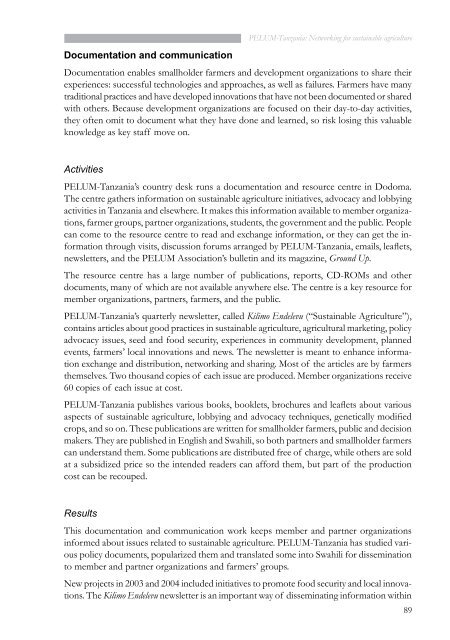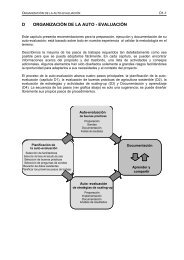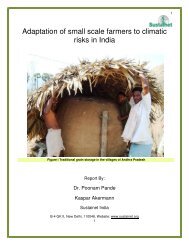cases from tanzania - Sustainet
cases from tanzania - Sustainet
cases from tanzania - Sustainet
Create successful ePaper yourself
Turn your PDF publications into a flip-book with our unique Google optimized e-Paper software.
Documentation and communication<br />
PELUM-Tanzania: Networking for sustainable agriculture<br />
Documentation enables smallholder farmers and development organizations to share their<br />
experiences: successful technologies and approaches, as well as failures. Farmers have many<br />
traditional practices and have developed innovations that have not been documented or shared<br />
with others. Because development organizations are focused on their day-to-day activities,<br />
they often omit to document what they have done and learned, so risk losing this valuable<br />
knowledge as key staff move on.<br />
Activities<br />
PELUM-Tanzania’s country desk runs a documentation and resource centre in Dodoma.<br />
The centre gathers information on sustainable agriculture initiatives, advocacy and lobbying<br />
activities in Tanzania and elsewhere. It makes this information available to member organizations,<br />
farmer groups, partner organizations, students, the government and the public. People<br />
can come to the resource centre to read and exchange information, or they can get the information<br />
through visits, discussion forums arranged by PELUM-Tanzania, emails, leaflets,<br />
newsletters, and the PELUM Association’s bulletin and its magazine, Ground Up.<br />
The resource centre has a large number of publications, reports, CD-ROMs and other<br />
documents, many of which are not available anywhere else. The centre is a key resource for<br />
member organizations, partners, farmers, and the public.<br />
PELUM-Tanzania’s quarterly newsletter, called Kilimo Endelevu (“Sustainable Agriculture”),<br />
contains articles about good practices in sustainable agriculture, agricultural marketing, policy<br />
advocacy issues, seed and food security, experiences in community development, planned<br />
events, farmers’ local innovations and news. The newsletter is meant to enhance information<br />
exchange and distribution, networking and sharing. Most of the articles are by farmers<br />
themselves. Two thousand copies of each issue are produced. Member organizations receive<br />
60 copies of each issue at cost.<br />
PELUM-Tanzania publishes various books, booklets, brochures and leaflets about various<br />
aspects of sustainable agriculture, lobbying and advocacy techniques, genetically modified<br />
crops, and so on. These publications are written for smallholder farmers, public and decision<br />
makers. They are published in English and Swahili, so both partners and smallholder farmers<br />
can understand them. Some publications are distributed free of charge, while others are sold<br />
at a subsidized price so the intended readers can afford them, but part of the production<br />
cost can be recouped.<br />
Results<br />
This documentation and communication work keeps member and partner organizations<br />
informed about issues related to sustainable agriculture. PELUM-Tanzania has studied various<br />
policy documents, popularized them and translated some into Swahili for dissemination<br />
to member and partner organizations and farmers’ groups.<br />
New projects in 2003 and 2004 included initiatives to promote food security and local innovations.<br />
The Kilimo Endelevu newsletter is an important way of disseminating information within<br />
89




